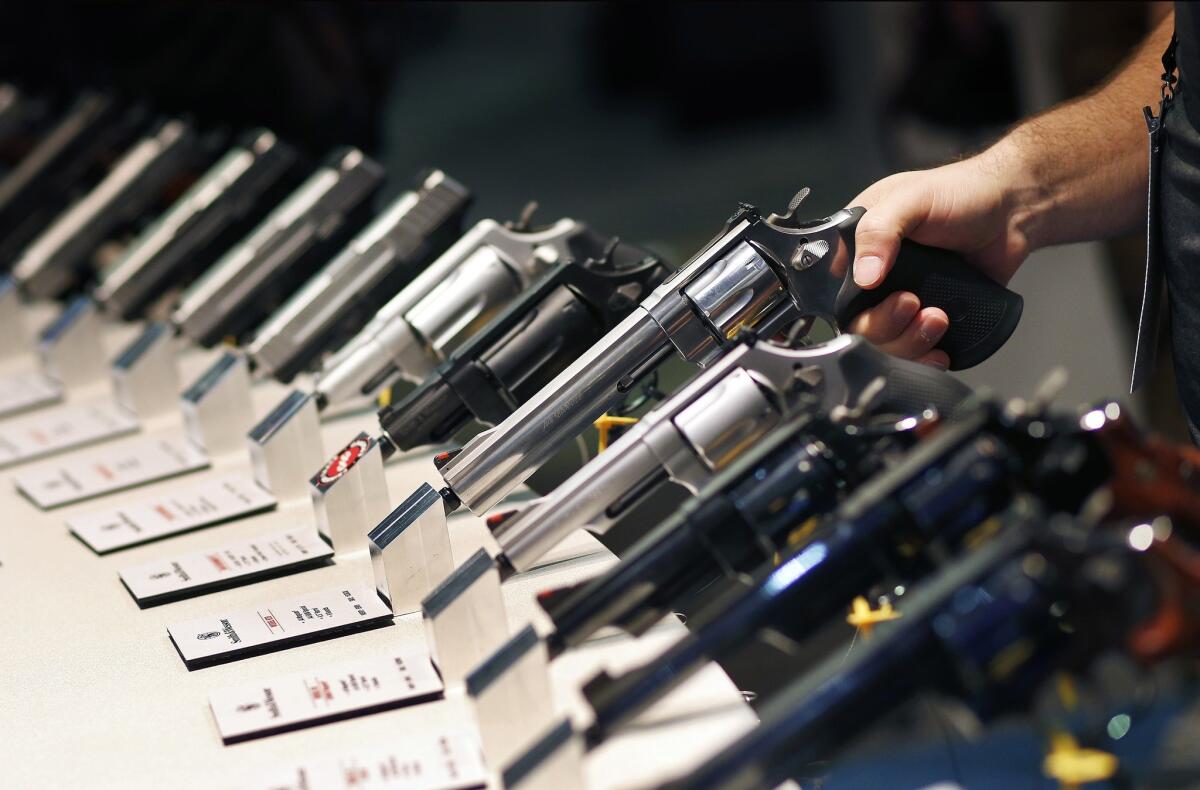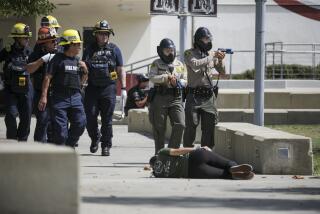In latest clash with NRA, Newsom signs bill to help police trace guns

- Share via
SACRAMENTO — New pistol models sold in California will eventually have to include micro-stamping technology that will make them easier to trace by law enforcement if they are used in crimes, under legislation signed Tuesday by Gov. Gavin Newsom.
The measure is the latest flashpoint in a years-long battle between the governor and the National Rifle Assn. that included a clash over Proposition 63, a 2016 initiative by then-Lt. Gov. Newsom, which regulated guns and ammunition.
The NRA has sued the state half a dozen times to challenge gun laws supported by Newsom, including that initiative.
The new law, which takes effect July 1, 2022, also requires the handguns to be equipped with safety measures including chamber load indicators and magazine disconnect mechanisms.
“This is a bill that will assist law enforcement in solving gun-related crimes via using micro-stamping technology and reduce the number of accidental gun deaths and injuries,” said Assembly member David Chiu (D-San Francisco), who introduced the bill.
California tried forcing gun makers to make firearms more trackable 12 years ago, but the industry said technology made it difficult to comply with a rule requiring two micro-stamps on each weapon.
The new law, AB 2847, simplifies the process by allowing one micro-stamp per firearm, which state officials say is technologically feasible.
The process involves imprinting microscopic sets of characters on the bullet cartridge casing when a weapon is fired, which allows law enforcement to match casings with the weapon from which they were fired.
As a result, the new law has the support of many law enforcement leaders in the state including state Atty. Gen. Xavier Becerra, Los Angeles City Atty. Mike Feuer and San Francisco Dist. Atty. Chesa Boudin.
“Micro-stamping firearms — so a bullet cartridge can be traced to a crime gun — protects public safety by giving law enforcement essential leads in tracking down the shooter,” Feuer said.
Tougher rules passed in 2007 applied to new handgun models, but manufacturers haven’t introduced new designs in the California market since then, state officials said.
The new law seeks to speed up micro-stamping of guns by instructing the attorney general to remove three models from the state list of handguns certified as safe for sale for each new compliant handgun model that is introduced.
The law is opposed by groups including the National Rifle Assn. and the California Rifle and Pistol Assn.
Removing three firearm models certified by the state as safe from the list of allowable guns for every new one added is “nonsensical and a blatant effort to curtail law-abiding citizens’ choice to determine the right firearm for the defense of themselves and their loved ones,” Daniel Reid, western regional director of the NRA’s Institute for Legislative Action, wrote in a letter to lawmakers.
Reid also questioned the viability and cost of micro-stamp technology, adding “if an individual were to acquire a micro-stamped handgun with the intent of using it in a crime, they could easily deface or replace the firing pin in order to defeat the technology.”
The California Sportsman’s Lobby also opposed the law, saying it will “substantially reduce” the number of pistols available to sports shooters to buy.
“The models currently on the roster are popular, not unsafe, and should continue to be available to sportsmen and other lawful individuals regardless of whether new models are added,” the group argued in a letter to lawmakers.
The new law’s supporters include Mattie Scott, president of Brady California United Against Gun Violence, whose son’s gun death remains unsolved more than two decades after he was shot while attending a graduation party in San Francisco.
“Micro-stamping policies could have helped to solve my son’s case,” Scott said.
The governor vetoed another gun control bill that was introduced to close a loophole identified when a 19-year-old gunman opened fire at a Poway synagogue last year.
The bill would have made it harder for people under age 21 to buy rifles by requiring gun dealers and the state Department of Justice to first confirm they had a valid hunter’s license.
Newsom wrote in his veto message that the DOJ does not currently have the technology to verify the validity of hunting licenses.
“In order to meet the requirements in this bill it would take DOJ 30 months to complete the information technology project,” Newsom wrote, adding that it would take resources away from other technology projects in the works to enforce requirements in seven previously approved gun control bills.
More to Read
Sign up for Essential California
The most important California stories and recommendations in your inbox every morning.
You may occasionally receive promotional content from the Los Angeles Times.











